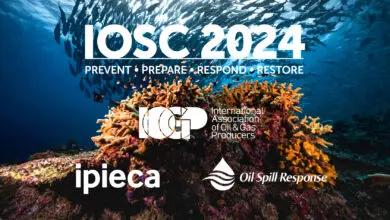
IOGP joins fight against methane emissions
IOGP is one of three global energy industry associations to sign on to the Methane Guiding Principles. These focus on continually reducing methane emissions; advancing strong performance across gas value chains; improving accuracy of methane emissions data; advocating sound policies and regulations on methane emissions; and increasing transparency.
The Association’s Executive Director, Gordon Ballard, made the commitment on behalf of IOGP. Other signatories were the heads of IGU and IPIECA.
“While we don’t have a mandate to enjoin our members, IOGP will play an important role in encouraging the application of the Guiding principles,” Gordon says. So far, 11 IOGP member companies have also signed the Principles: BP, Chevron, Eni, ExxonMobil, Qatar Petroleum, Repsol, Shell, Statoil, Total, Wintershall and Woodside.
“Signing on to the Principles is well aligned with our mission as the global voice of the upstream oil and gas industry and consistent with our ongoing activities, in particular in areas of advocacy and transparency,” Gordon concludes.
Commitment from IOGP, IGU and IPIECA forms part of wider efforts by the global energy industry to ensure that natural gas continues to play a critical role in helping meet future energy demand while tackling climate change and improving air quality. Since natural gas consists mainly of methane, a potent greenhouse gas, its role in the transition to a low-carbon future will be influenced by the extent to which methane emissions are reduced.
“Numerous scientific studies have shown how important it is to quickly reduce methane emissions, so we can meet growing demand for natural gas while achieving climate change and clean air goals,” said Mark Radka, Head of UN Environment’s Energy and Climate Branch.
“We’re delighted that the IGU, IOGP and IPIECA have become Associate Signatories to the Methane Guiding Principles. These organizations can help extend the spirit and intent of the Principles throughout the natural gas value chain and report on the reductions achieved.”
The Guiding Principles were developed with a coalition of international institutions, non-governmental organizations and academics, including the Environmental Defense Fund, the International Energy Agency, the Oil and Gas Climate Initiative Climate Investments, the Rocky Mountain Institute, the Sustainable Gas Institute, The Energy and Resources Institute and United Nations Environment.



